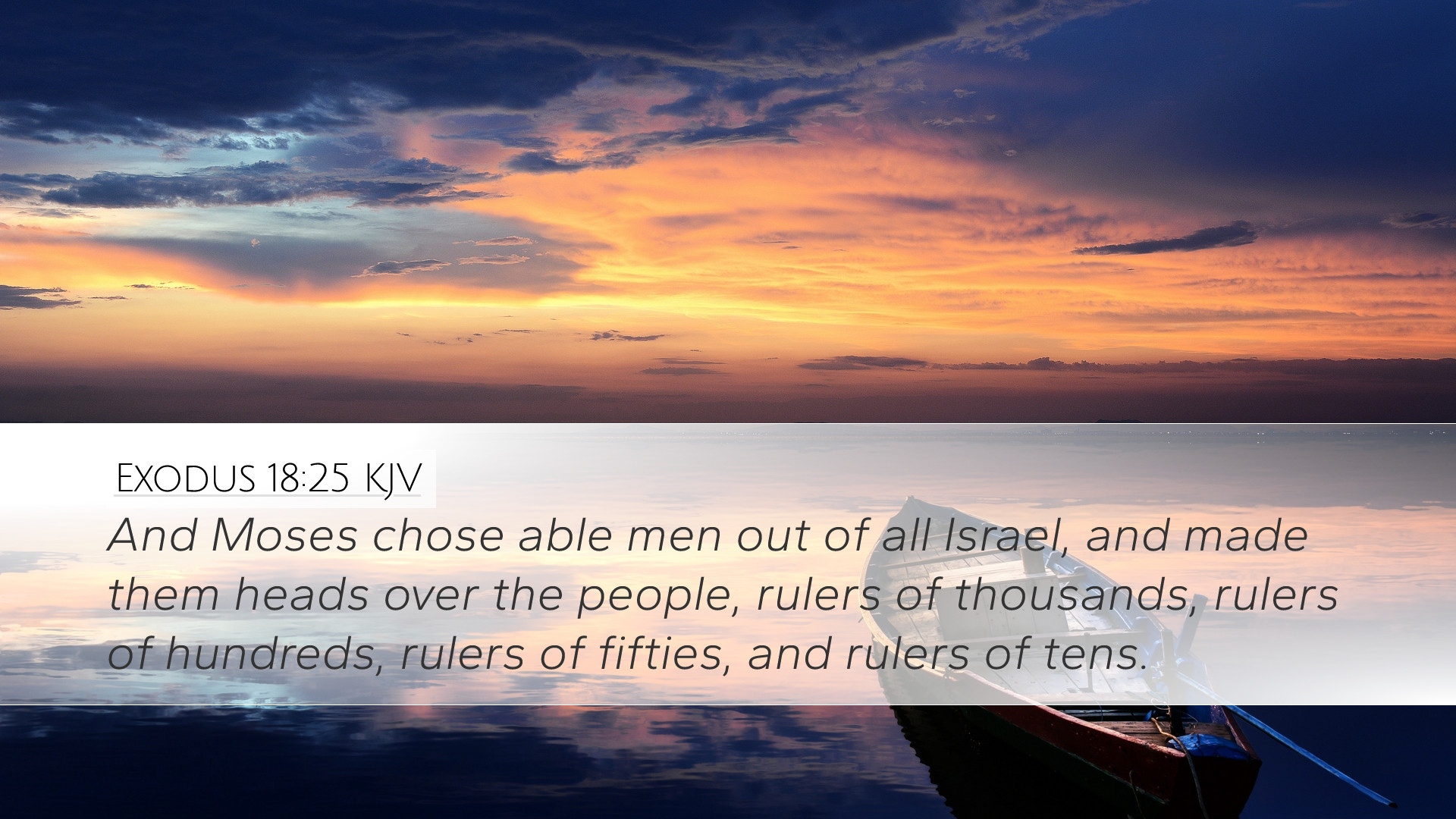Commentary on Exodus 18:25
Verse: "And Moses chose able men out of all Israel, and made them heads over the people, rulers of thousands, rulers of hundreds, rulers of fifties, and rulers of tens."
This verse captures a pivotal moment in the governance of the Israelite community, where Moses implements a system of delegation in response to the wise counsel of Jethro, his father-in-law. The commentary below provides a synthesis of insights from respected public domain commentators to enhance understanding for pastors, students, theologians, and scholars.
Historical Context
This passage occurs in the broader narrative of Israel's journey through the wilderness after their exodus from Egypt. Moses, having led the people through significant trials, faces the overwhelming burden of judging the people alone. Jethro's advice brings forth a necessary restructuring of leadership within the community.
Insights from Commentators
1. Matthew Henry
Matthew Henry emphasizes the significance of appointing capable leaders. He notes that Moses' choice shows a careful selection based on ability and integrity. The distinction of leaders into various ranks—thousands, hundreds, fifties, and tens—indicates a structured and systematic governance model suitable for a large nation. Henry remarks that this division not only lightens Moses' load but also ensures that justice and order are maintained among the people.
2. Adam Clarke
Clarke focuses on the characteristics of the men chosen by Moses. He suggests that they must be 'able men', highlighting the importance of both moral and spiritual qualifications in leadership. Clarke adds that these leaders are responsible for resolving smaller disputes, which prevents Moses from being overwhelmed. He draws attention to the wisdom in Jethro’s counsel that emphasizes shared leadership, suggesting that reliance on capable individuals is foundational in sustaining effective governance.
3. Albert Barnes
Albert Barnes points out the practical implications of Jethro’s advice and Moses’ implementation. He contends that establishing a hierarchy significantly enables the administration of justice and mitigates the risk of burnout for the leader. Barnes speaks to the future implications of this structure for helping the Israelites coexist harmoniously as a nation. His commentary emphasizes that the principle of delegated authority is vital not only in governance but also in religious life.
Theological Implications
From a theological standpoint, this verse provides profound insights into the nature of leadership as ordained by God. The act of selecting 'able men' reflects God’s intent for leaders to be both capable and divinely inspired. The hierarchical structure Moses employs can be viewed as a precursor to the systems of governance seen throughout the Bible. It highlights the necessity of diverse roles within the body of believers, akin to the New Testament's teachings on the church as a body with many parts (1 Corinthians 12).
Practical Applications
For pastors and church leaders, this verse and its accompanying commentary bring forth several practical applications:
- Delegation: Effective ministry often requires sharing responsibilities with others who have the necessary skills and spiritual gifts.
- Identifying Leaders: Just as Moses looked for capable men, church leaders should continually seek out individuals who exhibit potential for leadership and are grounded in their faith.
- Encouraging Justice: Leaders at various levels must work towards fairness and unity, ensuring that all community members feel heard and valued.
- Organizational Structure: A clear hierarchy, much like that of Moses’ leadership model, can foster a sense of order and clarity among members of the congregation.
Conclusion
Exodus 18:25 is not merely a historical account but a divine blueprint for leadership and governance. It reveals God's wisdom in creating order within the community and underscores the importance of capable leadership. The insights from Matthew Henry, Adam Clarke, and Albert Barnes provide rich commentary that encourages current and future leaders in their responsibilities. By embracing the principles outlined in this passage, spiritual leaders can effectively guide their congregations, fostering an environment conducive to growth, unity, and service.


